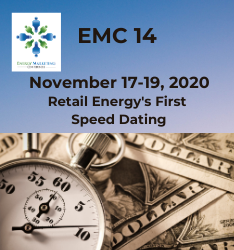|
|
|
|
|
Another Retail Choice Utility Seeks Authority To Offer Renewable Electric Option To Non-shopping Customers
The following story is brought free of charge to readers by EC Infosystems, the exclusive EDI provider of EnergyChoiceMatters.com
Ohio Power Company ('Company' or 'AEP Ohio') filed at the Public Utilities Commission of Ohio for approval of a new optional tariff that would allow customers to purchase blocks of RECs.
Ohio Power's proposed Green Tariff is an optional, voluntary service offering that allows non-shopping
customers to purchase RECs in 100 kilowatt-hour (kWh) blocks.
"If a subscriber shops for service, their subscription will end and the associated
charges will be bypassed. Participation under the Green Tariff is tied to the
customer’s status as an SSO or non-shopping customer from the Company," AEP Ohio said
Under the Green Tariff, customers may elect to purchase each month a specific number of fixed kWh
blocks, where each block equals 100 kWh. Customers may elect to purchase a
minimum of two (2) blocks per month and a maximum of 50 blocks per month.
Customers will initially pay $0.90 for each fixed kWh block under contract regardless of the customer’s actual energy
consumption. Pricing may be updated by AEP Ohio in the future.
"The pricing for the Green Tariff is based upon data provided to the Company
through a broker that bases the information on market activity. The Company
then took a simple average of three years rounded to the nearest half dollar in
order to determine the appropriate rate. The three-year average of Ohio RECs
market activity is used due to the volatility of REC pricing. The Company will
periodically update the Green Tariff rate in the future if there is a significant
change in the index calculation," AEP Ohio said
AEP Ohio said that, among other things, the tariff would serve to reduce the costs assigned, on an involuntary basis, to non-shopping customers related to several existing long-term PPAs whose costs are currently bypassable. The revenue from customers electing the optional Green Tariff would reduce such costs needed to be recovered.
AEP Ohio previously entered into three
renewable energy purchase agreements (REPAs), which the Commission has
found to be prudent and permitted cost recovery for years: (a) the Fowler Ridge
REPA, (b) the Timber Road REPA, and (c) the Wyandot solar REPA
(collectively, the AEP Ohio REPAs).
"Increased levels of shopping since initial implementation of the AEP Ohio REPAs
and enactment of HB 6 have caused the Company to possess extra RECs beyond
ongoing compliance levels and accrue a significant REC inventory over time.
That REC inventory is maintained in conjunction with the AER as approved by
the Commission most recently in the ESP IV proceeding (Case Nos. 16-1852-EL SSO et al.). As further explained below, the Company intends to sell RECs from
the Company’s REPAs to Green Tariff subscribers," AEP Ohio said
"In initially passing R.C. 4928.641 in 2014 as part of SB 310, the General
Assembly provided for ongoing bypassable recovery of the costs of AEP Ohio’s
REPAs. In amending that statute as part of HB 6 in 2019, the General Assembly
again recognized the unique position of AEP Ohio’s REPAs and provided for
continued bypassable cost recovery through 2032 even in light of the planned
ramp down and expiration of the renewable mandate. This statute and its
legislative history show that full recovery of AEP Ohio’s REPAs from non-shopping
customers is intended and the Commission should support the Company
in achieving that goal while staying within the parameters set forth in the statute," AEP Ohio said
"To that end, the Green Tariff helps promote equity and avoid potential rate
impacts among non-shopping customers. By enabling non-shopping customers
interested in voluntarily purchasing RECs to do so from the Company’s REPA
inventory, the ultimate cost to be recovered from other non-shopping customers
will be reduced; that is a win-win for both sets of non-shopping customers. For
example, if shopping continues to increase over time (whether through consumer
marketing or governmental aggregation), AEP Ohio’s non-shopping customers
will end up paying more for the Company’s REPAs (even after the renewable
mandate ends according to the terms of R.C. 4928.641). If a significant driver of
that shopping occurs through aggregation in urban communities, that means that
the Company’s rural customers could end up paying more than their fair share of
the historical REPA costs. But adopting the Green Tariff now will help manage those potential rate impacts and help protect against such future inequities among
the Company’s non-shopping residential customers," AEP Ohio said
"As referenced above, the Company plans to utilize extra RECs from the AER
inventory that are generated from the AEP Ohio REPAs, which otherwise would
be recovered through the AER, to support the non-shopping Green Tariff
subscribers. This component of the proposal would benefit each of its residential
customers (who individually may be non-shopping customers at any given time)
by keeping compliance costs lower overall. The revenue associated with REC
purchases under the Green Tariff will be applied against the book inventory cost
of the RECs," AEP Ohio said
Case 20-1603-EL-ATA
ADVERTISEMENT Copyright 2010-20 Energy Choice Matters. If you wish to share this story, please
email or post the website link; unauthorized copying, retransmission, or republication
prohibited.
Patronage Of Renewable Option Would Reduce Renewable Costs Recovered In Bypassable Rates
October 16, 2020
Email This Story
Copyright 2010-20 EnergyChoiceMatters.com
Commentary by Paul Ring • ring@energychoicematters.com
NEW Jobs on RetailEnergyJobs.com:
• NEW! -- Channel Partner Sales Manager -- Retail Supplier
• NEW! -- Sr. Billing Analyst -- Retail Supplier
• NEW! -- Director of Regulatory Affairs -- Retail Supplier -- Houston
• NEW! -- Energy Pricing Analyst -- Houston
• NEW! -- Retail Energy Account Executive -- Houston
• NEW! -- Sr. Sales Executive -- Retail Supplier
|
|
|
|









